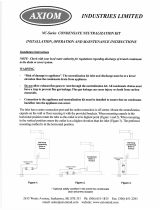
2
5601 189 v1.1
Vitodens 100-W, WB1B Technical Data
Product Information
General
Equipped with a Viessmann stainless steel heat exchanger
for lasting performance and reliability and a modulating
MatriX cylinder gas burner, the Vitodens 100-W wall-
mounted condensing boiler is the perfect combination of
value, quality and Viessmann technology.
The benefits at a glance:
Outstanding efficiency
of 94.0 % A.F.U.E. on all models.
Lasting performance
with Viessmann-made SA240 316Ti stainless steel
Inox-Radial heat exchanger constructed to ASME
Section IV and CSA B51.
Low-emission
with fully-modulating stainless steel MatriX cylinder
burner. Factory calibration eliminates adjustments in
the field.
< 29 ppm NOx (at 3% O2)
< 40 ppm CO (at 3% O2)
Control variety
Integrated boiler control interfaces with any level of
external control - from room thermostat to outdoor
reset and more.
Compact, lightweight wall mount design
and zero clearance to combustibles make it a great
choice for limited-space installations.
Extremely quiet operation
quieter than most refrigerators.
< 50 dBA [at 3.3 ft. (1 meter)]
Easy installation, service and maintenance
with all pipe connections located at the bottom
and serviceable components (including electrical
connections) easily accessible from the front.
Multiple venting options
- Horizontal or vertical sealed combustion
coaxial, PP(s) vent system (Viessmann supplied).
- Horizontal, vertical or hybrid sealed combustion
double-pipe CPVC vent system (field supplied).
- Horizontal or vertical single pipe CPVC vent system
(field supplied).
- Horizontal or vertical single or double pipe PP(s),
flexible vent system (Viessmann supplied).
Suitable for high altitude levels
of up to 10,000 ft. (3,000 m) without deration.
Built-in automatic frost protection
allows boiler to be shut off for an extended period
of time while protecting it against freeze-up.
Reliable on demand hot water
with an optional CombiPLUS kit (no DHW tank required).
- Plate type heat exchanger
- Built-in diverting valve
- Built-in Grundfos 3-speed pump
- Built-in pressure bypass valve
- Built-in water hammer arrester
- Built-in flow sensor
- Built-in temperature sensor
- Supplied with a pressure relief valve rated at 150 psi
Note: Check the boiler rating plate on the Vitodens 100-W,
models WB1B-26 or WB1B-35 to ensure it states
compatibility with the CombiPLUS kit.
Limited lifetime warranty
in residential applications.





















